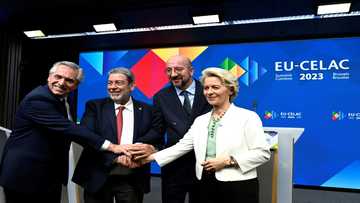'Oppenheimer' a warning to world on AI, says director Nolan

Source: AFP
Don't miss out! Get your daily dose of sports news straight to your phone. Join YEN's Sports News channel on WhatsApp now!
The story of the invention of the atomic bomb told in the new film "Oppenheimer" is a "warning" to the world as we grapple with artificial intelligence, insists the movie's director Christopher Nolan.
The British-born maker of "Memento", "Dunkirk" and the "Batman" trilogy said he believes a lot of the anguish around technology "in our imagination stems from (Robert) Oppenheimer," the physicist who helped invent nuclear weapons during World War II.
What he and his team at the Los Alamos Laboratory in the United States did was "the ultimate expression of science... which is such a positive thing, having the ultimate negative consequences," Nolan said.
Like back then, the startling advances in artificial intelligence (AI) are raising similar fears about the dangers of a technology with potentially uncontrollable consequences.
Some worry that AI could escape its creators and endanger humanity, much like scientists and others fretted eight decades ago with the dawn of the nuclear age.
"That was a moment in history. This is one too," Nolan's star Cillian Murphy -- who plays the haunted scientist -- told AFP while the pair were in Paris to promote the film, which opens across the globe this weekend.
"Artificial intelligence researchers refer to the present moment as an 'Oppenheimer moment'," said Nolan, referring to the first atomic tests, when some feared nuclear fission would lead to an uncontrolled chain reaction that would pulverise the entire planet.
Those now working on AI "look at his story for some guidance as to what is their responsibility -- as to what they should be doing," Nolan said.
"But I don't think it offers any easy answers. It is a cautionary tale. It shows the dangers."
"The emergence of new technologies is quite often accompanied by a sense of dread about where that might lead," he argued.
Dilemma
Nolan's drama turns on the dilemma this posed for the scientists working on the Manhattan Project, the codename of the drive to develop the bombs that were later dropped on Hiroshima and Nagasaki.

Source: AFP
"They had lived through World War I and they were trying to end World War II," he said.
Oppenheimer argued in vain for international control of nuclear weapons, hoping it would lead to peace.
The director said many would argue that "actually some stability in the world has been achieved through the existence of these weapons.
"Personally, I don't find that reassuring, but it just goes to show there are absolutely no easy answers to the dilemma."
The war in Ukraine has reawakened the threat of nuclear Armageddon raising tensions between the superpowers not seen since the end of the Cold War.
Actor Matt Damon, who plays General Leslie Groves, the head of the Manhattan Project, said the last year has been a reality check that the danger of nuclear disaster is still very much there.
"How did I forget about this? It's like the Cold War ended and my brain played a trick on me and said, 'OK, let's put that away, you don't have to worry about that anymore' -- which is absurd."
But as soon as Russia invaded Ukraine "suddenly overnight it became the most important thing for us all to think about again," said the 52-year-old star.
"Oppenheimer" is facing off against "Barbie" in the biggest clash of Hollywood summer blockbusters, with both opening on the same day in a duel the media has dubbed "Barbenheimer".
New feature: Сheck out news that is picked for YOU ➡️ click on “Recommended for you” and enjoy!
Source: AFP




